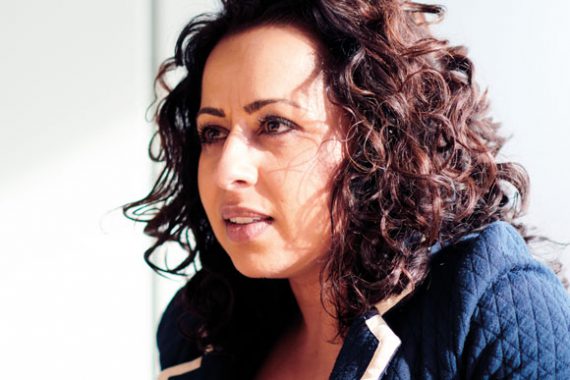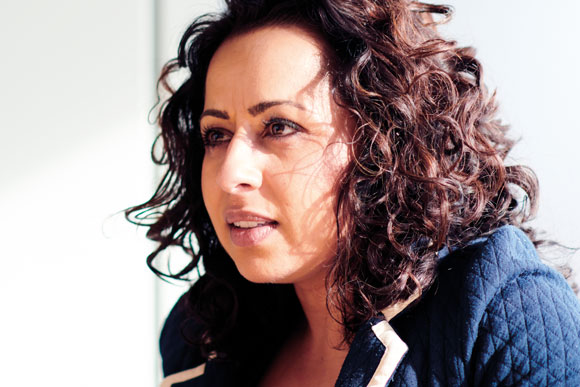Dr Nikita Kanani: ‘This contract provides the beginning of a response’


NHS England’s acting director for primary care is that rare beast – an NHS England official who is admired by the grassroots. Dr Nikita Kanani has managed to foster goodwill by being accessible. ‘So many practices already have my mobile number and can tweet me or email me, or whatever because I want to hear what’s going on,’ she says.
We are meeting at the NHS England headquarters in London for what is Dr Kanani’s first full-length one-to-one interview since she took on her role in August last year. And there have been early successes. She was instrumental in persuading the Government to commit to primary and community care £4.5bn of its £20.5bn uplift for the NHS – a far larger proportion than in recent years.
And she has just negotiated the most substantial changes to the GP contract in 15 years, producing a deal that will incentivise practices to join networks of 30,000 to 50,000 patients in exchange for various new pots of funding.
Of course, this goodwill could be short lived if the contract fails to bring about the expected changes. There are already concerns over the tight timetable to join networks, moves to name GPs earning more than £150,000 and – most of all – a lack of measures to tackle workload immediately.
But Dr Kanani does have personal knowledge of the pressures GPs are under: ‘I was in the surgery yesterday and I had an awful surgery. It was upsetting and I felt very emotional. It was a really complex day and GP colleagues feel that two, three, four, five times a week because of the way they work. We do need to support them.’
The contract has been fairly well received, but doesn’t mention workload. Given the pressures GPs face, what would you say the contract does for workload in the immediate term?
I think the contract has two broad things that help to support our practices and our colleagues in general practice. First of all, the core contract increases the amount of money going into general practice every year until 2023/24. And actually if we break that down a little, it will take away some of the pressures we’re all facing, for instance by managing our indemnity schemes and helping to deal with subject access requests – operational things that are just exhausting.
Second, I think many of us would recognise there’s a number of people who could be looked after better by somebody else. If we can help to support general practice in making sure patients see the right person – not always the GP, perhaps the clinical pharmacist or the social prescriber – through the network contract, then hopefully general practice gets that opportunity to sustain and then to re-energise in this new kind of model.
There are some discrete pieces of work to target the actual current workload pressures, such as our work with the ‘primary secondary interface’ group [to prevent workload dump from secondary care]. We’ve worked to ensure allied health professionals can prescribe fit notes, so it doesn’t all sit in primary care. We’re also trying to work more closely with Capita and NHS Pensions to achieve more straightforward processes.
And I think we need to look at the results of Pulse’s workload survey to see how we can make workload more manageable.
What this contract does is provide the beginnings of a response. I’m not saying that everything is delivered yet – this is a five-year contract for a reason. But there’s a huge amount of things within it that say we will look after you and we will stabilise and support general practice and help you prepare for the future. Because that’s absolutely what we’re going to do.
Workload is obviously tied to workforce. We know that there is still a desire to recruit 5,000 GPs – how are you trying to achieve this?
The 5,000 target is still there, but there is a much more reflective commentary around that target in the contract document. We want to make the work better for GPs, so that they want to stay.
We’ve realised that is a really difficult number to pin down within the set amount of time [by the original deadline of 2020]. I think what we’ve done really well is recruit people to GP training – in the highest numbers we’ve ever seen. And now we need to translate that to retaining GPs in the middle of their career and also to keeping people at the end of their career.
We’re now asking, what happens through your GP training? What happens when you come out? Are you supported? Are you excited about staying in general practice? What happens in the middle of your career and how do we support you to provide care?
And then towards the end of your career, how do we keep you in general practice? We’ve already got the GP retention scheme, and now we’ve got a reboot of appraisal and revalidation under way, because we know one of the challenges GPs find in their career is how complex it is to stay appraised and revalidated under the current guidelines.

nikki kanani mar2019
What guarantee is there that we’ll be able to recruit these 20,000 non-GP professionals or that they’ll want to come to general practice?
We’ve worked carefully through each of the groups that we’ve set out. And we’ve picked those groups specifically because we knew there was a pipeline. There’s a reason that clinical pharmacists and social prescribers start first and other professions come in a bit later. We’ve worked with the professional bodies and Health Education England to agree some trajectories around what can we actually expect.
We’ve done a huge amount of work with the personalised care team here to find out the expectations around social prescribing and link workers. How many are there? What training is available, and so on. So we can make sure we’re able to guarantee that pipeline. I’m confident we can actually do that over the next five years.
And what is the evidence that other staff will actually be able to relieve GPs’ workload?
We’ve obviously already delivered the clinical pharmacist scheme. This is different, not necessarily because of the type of work, but due to the approach that we’re taking [of guaranteeing 70% of a pharmacist’s salary on a recurring basis]. Previously we’ve taken an approach where practices have to bid and then get tapered funding. We’ve heard that’s frustrating and doesn’t work for practices.
In terms of evidence, we know social prescribing has a strong evidence base, and we’ve got some research evidence on the role of physician associates. The role of paramedics is definitely newer but not so new that we can’t learn from it. I visited a practice in Maidstone, where the paramedic Rob – who’s done some work with long-term conditions as well – is brilliant. I think every practice needs a Rob – someone who can get out, do things and support people.
Moving on to networks, the deadline to join them is very short. Will that be a problem for practices?
In our planner guidance for 2018/19, we asked CCGs to start to find, organise and recognise the networks so we had a sense of where practices and commissioning organisations were. At the last count, CCGs said 88% of practices are in networks. I think [the real number] is probably a bit lower, because people account for networks in slightly different ways.
But I think enough practices are actually part of a group. We’ve got to remember that this is more of an evolution. This is about practices working together. So, naturally most areas will have developed into localities or clusters. And you’ll start to know each other, and you’ll start to have a feel of who you might be able to work with, and how.
The timescale is tight, but it’s tight because I want practices to start to engage in this way so that we can get money and support and resources out to them and we can start moving forward.
Where do you see general practice in a year or two years’ time? Do you think we’re going to see reduced workload and the end of 11-hour days?
I really hope so. I feel the reason I’m really keen to be connected to the profession is that I hear those stories all the time.
Let’s let practices get some of the benefit in the core contract, the opportunity to work together. I hope that, in a year, practices will start to say ‘yeah, I was right to be excited about that, I was right to feel hopeful, because I can start to the see the benefit’. And in two years, I hope they say, ‘okay, we’ve geared up, we’re a network now, give us more support to work more and to deliver primary care genuinely as a heart of the NHS’. And for the first time, to flip the funding and flip the investment and flip the support to make sure it really is seated in primary care.
I’m really looking forward to us as a wider system working together to make this contract a genuine sign of hope for general practice. Primary care needs support to develop into whatever the future looks like, reflecting the changing population and workforce. I think this is our chance. So, I’m looking forward to working together across different parts of the system. Working with Pulse. Understanding what we can do, how we can listen, to make general practice great.
CV
Education
• 2004
Qualified from Guys, Kings and St Thomas’ Medical School
Career
• 2012 – present
GP, south-east London
• Aug 2018 – present
Acting director of primary care, NHS England
• Feb-Aug 2018
Deputy medical director of primary care, NHS England
• 2016 – 2018
Chief clinical officer, NHS Bexley CCG
• 2013 – 2016
Vice-chair, then chair, NHS Bexley CCG
Other interests
Co-founder, with her sister, of STEMMsisters, a social enterprise supporting young people to study science, technology, engineering, maths and medicine.
Enjoys lifting weights, reading and exploring with her two young children











